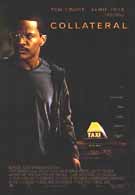Michael Mann has returned from the abyss after his fractured and obsessively failed presentation of the life of Ali. Collateral is his best work so far, blending together a dark and sometimes brutal hitman story with that of a normal guy just trying to get home from work. The mixture turns out to be a movie that’s unflinchingly real, carried by standout performances and an almost viciously alive digital style.
Despite what the posters may tell you, this movie doesn’t star Tom Cruise. It stars Jamie Foxx as a hard working cab driver who picks up the wrong fare. Tom Cruise is just the guy with a gun who ends up sitting in his back seat. Don’t get me wrong, Cruise is great back there as Vincent, a cold hearted and brutal killer who hires a cab driver named Max (Foxx) on false pretenses to take him about his appointed rounds. Vincent goes through his own kind of journey in the film, and playing a dark-hearted hitman is a new direction for Cruise. He fills those devilish shoes well, his gaze unflinching, no matter how much Vincent smiles, there’s never laughter behind his eyes. Still, this is Jamie Foxx’s movie. From beginning to end, this is for the most part Max’s journey and it’s Foxx that draws us in. He’s just an average guy, driving a cab temporarily to fill in while he gets his own thing off the ground. He’s not interested in conversation with Vincent, he doesn’t really want to talk about what he has going. When Vincent presses him to find out how long he’s been driving, Max confesses, “twelve years.”
On Vincent’s first stop things go bad, a body falls out a window, and Max finds out what’s going on. But Vincent isn’t about to let him back out of their arrangement and so with a gun often quite literally to his head, Max drives around an almost idealized vision of late-night L.A. while Vincent acts as a pay for play angel of death. Max is trapped. At first he doesn’t want to tell anyone, he isn’t trying to save anyone, he just wants to get through the night and get back to his crib. Jamie Foxx calls that something he drew from the “black experience” but I’d call it simply human. You’ve “gotta roll with it” proclaims Cruise, but Max isn’t ready to roll. The shocks for Max just keep on coming, and the movie surprises you by not shying away from frequent and savage punches to the audience’s collective gut.
Max is an exhausted character, worn out. He doesn’t want excitement good or bad, he just wants to get out. He’s lived the same daily routine for years, kept alive by a dream that will never happen unless he can make it perfect, which he never will. Max isn’t the kind of guy who acts, who reaches out for anything. He just lives. Jamie captures that coolly while at the same time making Max a likable and engaging character, the kind of guy you know could do something special if only he’d just reach out for it. In Foxx's hands he feels incredibly natural. How long can he stand by and watch Vincent’s grisly work? At what point will just getting home not be enough? How much can one normal guy take?
Normally, I’m not a fan of shooting in digital. It gives the movie a markedly different look from anything you’ll normally see. In this case though, digital works to Michael Mann’s advantage, giving the highways of his beloved L.A. an almost dreamlike sharpness as Max struggles through his own kind of nightmare. Other times he uses it to give the film an immersive kind of authenticity, which only makes the reality of Max’s situation all the grittier. Standout is Collateral’s already widely trumpeted club scene, in which Vincent works his way with Max through a crowd to his target against the beats of a brilliantly mixed bit of music, notable in a film of pitch perfect popular and movie specific scores. Shooting in digital lets Mann make the lights of his world brighter and more brilliant, the club strobes dancing across the screen and his characters with eerie definition. Seen out a darkened office window, the lights of Los Angeles have never looked so shockingly beautiful, reminiscent in a way of what Sofia Coppola did to Tokyo in her work on Lost in Translation, were Coppola to have shot Tokyo almost entirely from aerials.
If you’re looking for action, Collateral has that too, though I wouldn’t really call it an action movie. It’s actually a gritty character study that happens to have a lot of brutal violence mixed up in it. Still, Tom Cruise gets plenty of chances to run his ass off (I love watching how fast that little guy can move!) and there’s a ton of gunplay and crazy fighting, particularly in the above mentioned club scenario. Mann has a real talent for hard hitting gunplay as realistic violence and while this obviously isn’t his first attempt at it, it’s certainly one of his best. Cruise is a convincing and veteran action star and picks up all of Collateral’s action requirements like a real pro, perfect for a character like Vincent who is so professional in his killing it’s almost become automatic. He strides purposefully through the picture, his steps never breaking as he charges towards various objectives. Vincent’s approaches are creative and exciting, so while this isn’t truly a big money action flick, it can easily hold its own against any other gun fest with fewer dramatic trappings. Of note is the welcome absence of the shaky cam, which so often hacks otherwise fun action flicks off at the knees in some lame director’s attempt to be MTV hip. Mann doesn’t need gimmicks to be cool, for Collateral that comes naturally.
Collateral is the kind of movie I can’t wait to see again. It’s the sort of thing I’ll own on DVD and watch over and over, just to pick out the little nuances in Cruise’s and Foxx’s performances or to watch for the moment when Max really and truly breaks. I can’t imagine what this movie would have been like had Adam Sandler been cast as Max instead of Foxx, as Michael Mann had originally intended. This is a film built around what Jamie Foxx can bring to the picture and one that scores big on his shoulders. Here’s hoping he gives up comedy (since he’s not very funny) and focuses on more projects like this. If he does, Jamie Foxx will soon be holding an Oscar. For now, Michael Mann has created a masterful and original movie using a format a lot of filmmakers don’t even understand yet, with a lead actor who until recently wasn’t known for playing serious and challenging roles, and backed up by arguably the world’s biggest movie star playing completely against type. That it all fits together so wonderfully is quite an amazing accomplishment, hampered only slightly by the need for co-incidence to wrap things up in the end. Collateral is a fresh, smart, and smooth piece of filmmaking that surpasses the hype generated by its premise.
Your Daily Blend of Entertainment News

